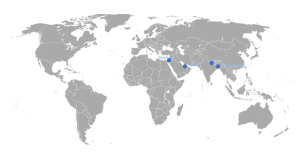[four_fifth]
About
Working Papers
Publications
Funders
[full_width]
About the Program
Economic theory and evidence from social psychology predict that migrant workers are disadvantaged in their relationship with their employers. Migrants are particularly vulnerable if they lack control of their documents, incur recruitment fee related debt and are deceived about their working and living conditions. We conducted impact evaluations of two fair recruitment pilots designed to cover the entire recruitment process from sending community to arrival along the Nepal-Jordan and Bangladesh-Qatar corridors. Fair recruitment implies absence of recruitment fees or related costs, adequate and efficient screening for and training in job skills, full disclosure of employment terms and conditions and pre-departure training on rights and obligations.
Nepal-Jordan Corridor. Two hundred migrants were recruited through a fair process and followed from the point of arrival in Kathmandu until 12 months following migration to Jordan. Migrant mental health, physical health, work expectations, work experiences, use of grievance procedures, psychological processes and productivity were tracked.
Identification was achieved by comparing migration experiences of fairly recruited migrants to existing data on current migrants and by constructing a control group from recent and previous migrants currently employed in participating Jordanian factories.
Process tracing was employed to analyze data from the point of arrival in Kathmandu to the point of arrival in Amman. A difference in difference methodology was used to analyze data from the point of arrival in Amman to 12 months following migration.
Bangladesh-Qatar Corridor. Following an intervention with the recruitment agency (n=598), migrants paid less money in recruitment fees and reported feeling less obligation to migrate as compared to conventionally recruited migrants. They also reported working fewer hours, better employment interactions with supervisors, better mental health, less organizational tolerance for abuse at work, and greater interest in migrating again. However, job satisfaction and trust in the employer were higher among conventionally recruited migrants, indicating that conventional recruitment practices may induce post-decision dissonance. Our findings provide evidence that recruitment practices are instrumental in outcomes for prospective migrants and can be improved with a recruiter intervention. We further identify aspects of conventional recruiting practices that entrap migrants. Eliminating recruitment fees and concern with debt, clearly explaining contract terms and pay calculations, and ensuring that migrants control the migration decision diminish the sunk cost effect and post-decision dissonance.
Working Papers
The benefits of fair recruitment – Results of the impact study on the Nepal-Jordan corridor
https://www.ilo.org/global/topics/fair-recruitment/publications/WCMS_750465/lang–en/index.htm
Publications
“Improving Migration Experiences for Workers: Recruitment Practices along the Bangladesh-Qatar Corridor,” L. Babbitt, D. Brown, A. Antolin and N. Toosi, World Development Perspectives, June, 2023. https://doi.org/10.1016/j.wdp.2023.100506
Funders
The International Labour Organization (ILO).
[/full_width]
